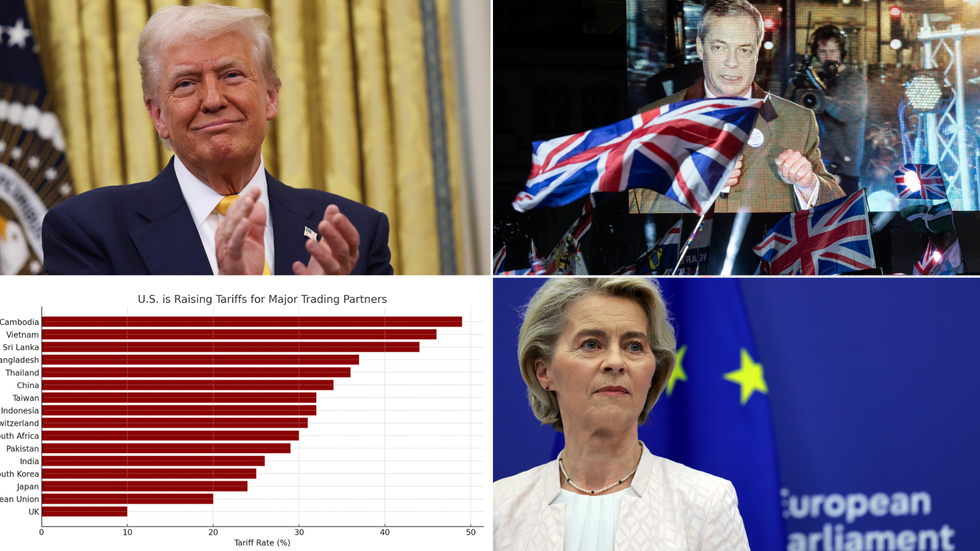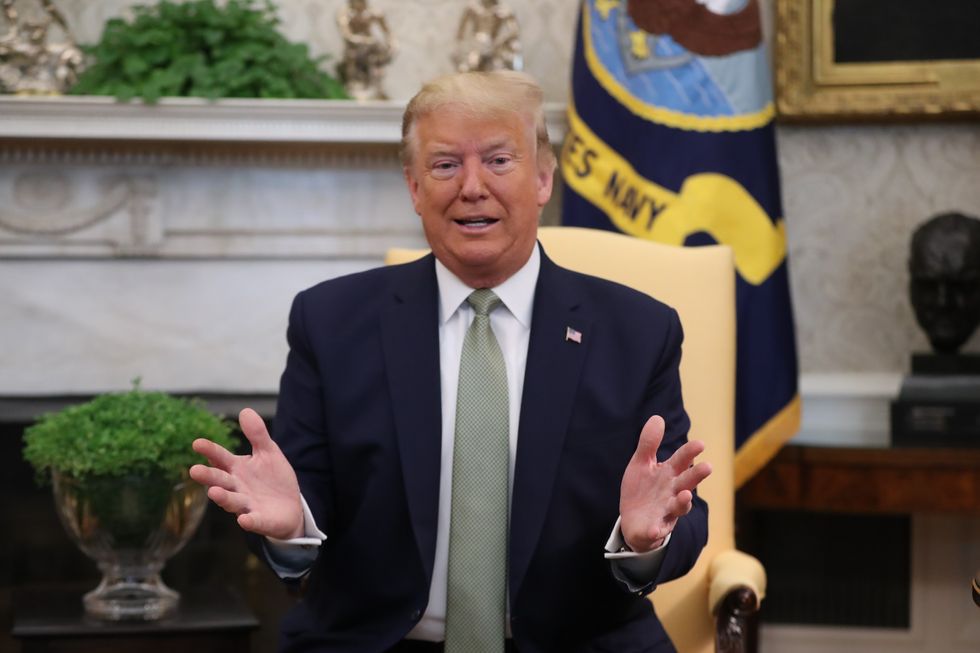Donald Trump says the US has been ripped off by the rest of the world
GB News
The shock revelation comes after the 47th President slapped a 100 per cent higher tariff rate on the EU
Don't Miss
Most Read
Trending on GB News
Brexit Britain was spared the worst of Donald Trump's tariffs while the EU bore the brunt - but the UK could have potentially faced zero tariffs if the divorce from the bloc had been cleaner, an exclusive analysis shows.
The comparative win for Britain comes after Trump's historic speech in the White House Rose Garden to mark "Liberation Day" on Wednesday.
Global financial markets braced for the worst as the 47th President unveiled a raft of "reciprocal" tariffs on US imports from most countries.
At the 11th hour, Keir Starmer offered his US counterpart a suite of concessions in a last-ditch bid to strike a deal that would shield Britain from the punishing tariffs.
The PM will be breathing a sigh of relief this morning as Trump imposed the lowest level of levies on the UK, applying only a 10 per cent tariff on most British goods. Meanwhile, the EU received a 100 per cent higher tariff rate than its neighbour, with a 20 per cent retaliatory levy.

Brexit Britain saved from worst tariffs but complete divergence from the bloc could have spared us from all levies, an analysis shows
ChatGPT/Getty Images
Facts4EU's analysis of US trade documents suggests it was not the Prime Minister's charm offensive but Brexit that saved the day - and it could have been an even smoother ride if we'd had a full and clean break from the bloc.
The report, prepared by the Office of US Trade Representative ahead of the new tariffs, discusses the largest export markets for the United States, covering nearly 60 trading partners and looks at all forms of trade barriers.
The EU’s section in this document is 34 pages long outlining a wide variety of trade practices the US considers to be unreasonable.
By contrast, the section on the UK is just five pages long. Revealingly, it singles out some positives for the UK, before then saying:
“The UK has some high tariffs that affect U.S. exports, such as rates of up to 25.0% for some fish and seafood products, 10.0 per cent for trucks, 10.0 per cent for passenger vehicles, and up to 6.5 per cent for certain mineral or chemical fertilisers.”
These are all tariffs inherited from being a member of the EU and have not been repealed since the UK became independent.
The US administration does not say so, but this passage in a document from the US official trade department informing the President’s decision does beg the question of what that decision on the UK would have been if the UK government had repealed these inherited EU tariffs.
Not out of the woods...yet
More worryingly, the document singles out areas of concern regarding the UK's continued alignment with EU policies.
“Following withdrawal from the EU, the UK transposed existing EU technical regulations into UK law in 2021, thus creating close initial alignment between UK and EU technical regulations and requirements," the report states in one passage.
LATEST MEMBERSHIP DEVELOPMENTS
- Will Keir Starmer sell out Britain in last minute panicked move to avoid Trump tariffs? We investigate
- MAPPED: The six councils slapping highest tax rises on Britons - and the salaries of their town hall bosses
- Fix Britain first!’ Eight INSANE projects that YOUR tax money is going on as calls for UK DOGE grow louder

The EU came in Trump's crosshairs, with a 20 per cent retaliatory levy imposed on goods.
PA“Several specific trade concerns outlined in the technical barriers to trade (TBT) section of the EU Chapter in this National Trade Estimate Report therefore remain with respect to the UK. Additional divergences between the two regimes will likely continue because changes to some EU regulations have not been, or will not be, automatically reflected in the UK regulatory regime (with the exception of Northern Ireland under the Windsor Framework) and vice versa.”
It is therefore reasonable to conclude that had the UK government diverged fully from the EU trade regime as it should have done following Brexit, the chances of the UK being exempted from 'retaliatory tariffs' completely would have been even higher.
Shadow trade secretary Andrew Griffith acknowledged this decisive win for post-Brexit Britain, saying: "The silver lining is that Brexit - which Labour ministers voted against no less than 48 times - means that we face far lower tariffs than the EU: a Brexit dividend that will have protected thousands of British jobs and businesses."
The response from Brussels was much more muted, with EU Commission President Ursula von der Leyen releasing a statement that seemed to deflect attention away from the fact that the EU now faces one of the highest tariffs in the world for a major trading partner.
With a great deal of focus on the tariffs slapped on other countries, she said: “President Trump's announcement of universal tariffs on the whole world, including the EU, is a major blow to the world economy…. The global economy will massively suffer…. The consequences will be dire for millions of people around the globe…. Also for the most vulnerable countries, which are now subject to some of the highest US tariffs…. The tariffs will also hurt consumers around the world.”








